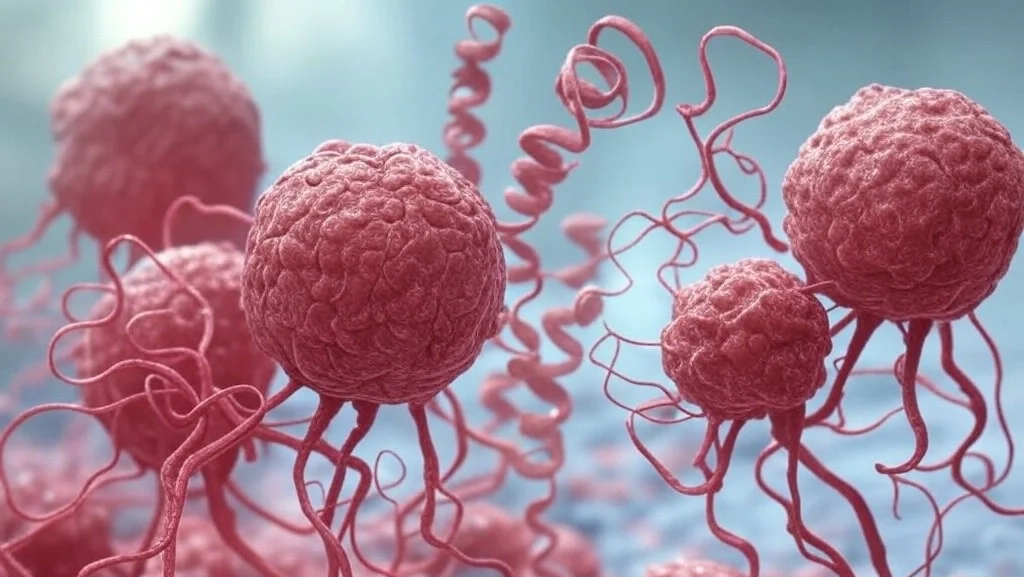
Is Nagalase a Tumor Marker? Understanding Its Role in Cancer and Immune Diseases
Alpha-N-acetylgalactosaminidase (nagalase) is an enzyme found in the blood that plays a crucial role in both cancer progression and immune system regulation. This extracellular matrix-degrading enzyme is secreted by cancer cells during tumor invasion and is also an intrinsic component of envelope proteins in various viruses, including HIV, Epstein-Barr virus (EBV), herpes zoster, and influenza.
The Role of Nagalase in the Immune System
Nagalase interferes with the activation of macrophages, which are essential for immune defense. It does so by deglycosylating the vitamin D3-binding protein (Gc-protein), which is the precursor to macrophage-activating factor (MAF). Normally, Gc-protein undergoes a process where specific sugar residues are removed, leading to the production of MAF. However, when nagalase removes the entire trisaccharide from Gc-protein, the conversion to MAF is blocked, resulting in immunosuppression.
Nagalase as a Tumor Marker
Elevated nagalase activity has been observed in patients with a wide range of cancers, including:
- Prostate, breast, colon, lung, esophagus, stomach, liver, pancreas, kidney, and bladder cancers
- Testicular, uterine, and ovarian cancers
- Mesothelioma, melanoma, fibrosarcoma, glioblastoma, neuroblastoma, and various leukemias
The secretion of nagalase varies depending on tumor type, size, stage, malignancy, and invasiveness. Importantly, increased nagalase activity has not been detected in the blood of healthy individuals, making it a potential biomarker for cancer detection and monitoring.
Nagalase and Tumor Burden
Research suggests a direct correlation between nagalase levels and tumor burden. Studies indicate that nagalase measurements can detect cancerous lesions at levels below those detectable by other diagnostic methods. Notably, nagalase activity decreases significantly—often to near-normal levels—within 24 hours of surgical tumor removal, indicating its short half-life. This characteristic makes nagalase a valuable marker for assessing treatment efficacy.
Nagalase in Viral Infections and Autoimmune Diseases
In addition to its association with cancer, nagalase is also linked to viral infections and immune disorders. It is an intrinsic component of the envelope protein gp160 in HIV and the hemagglutinin (HA) protein in influenza virus. Additionally, increased nagalase activity has been detected in patients with systemic lupus erythematosus (SLE), an autoimmune disease.
Gc-MAF and Nagalase in Cancer Treatment
Research has demonstrated that administering Gc-MAF (100 ng/week) in cancer patients leads to a significant reduction in nagalase levels. In a study of 20 cancer patients:
- Mean nagalase levels dropped from 2.84 to 2.01 after 112 days
- Further reduction to 1.59 was observed after 263 days
In most cases, complementary treatments, such as nutritional supplements and acupuncture, were used. A decline in nagalase activity correlated with improved clinical conditions.
Clinical Applications of Nagalase Testing
Testing for nagalase in blood is a highly sensitive method for monitoring therapy efficacy in cancer and certain viral infections, including HIV. Given its short half-life, nagalase is particularly useful for real-time monitoring of treatment progress. Physicians and oncologists can use nagalase levels to fine-tune treatment approaches, improving patient outcomes.
Important Considerations
- Nagalase levels may be influenced by certain medications taken within five days before testing. Patients should disclose any drug use on the questionnaire submitted with the requisition form.
Take Control of Your Health
If you are concerned about cancer, immune diseases, or viral infections, testing your nagalase levels can provide crucial insights. Take charge of your well-being—order your nagalase test today and get accurate results to guide your healthcare decisions.
Conclusion
Nagalase is emerging as a crucial biomarker in cancer diagnostics and immune system function. Its ability to indicate tumor presence, track tumor burden, and monitor treatment efficacy makes it a valuable tool in oncology and virology. As research progresses, nagalase testing may become an even more integral part of personalized medicine for cancer and immune-related diseases.
Literature
- Korbelik M., VR Naraparaju and N Yamamoto. The value of serum alfa-N-acetylgalactosaminidase measurement for the assessment of tumour response to radio- and photodynamic therapy. British Joumal of Cancer (1998) 77(6), 1009-1014
- Reddi AL et al. Serum alpha-N-acetylgalactosaminidase is associated with diagnosis/prognosis of patients with squamous cell carcinoma of the uterine cervix. Cancer Lett. 2000 Sep 29;158(1):61-4.
- Yamamoto N. and Urade M. Pathogenic significance of alpha-N-acetylgalactosaminidase activity found in the hemagglutinin of influenza virus..Microbes Infect 2005 Apr;7(4):674-81. Epub 2005 Mar 22
- Yamamoto N. Pathogenic significance of alpha-N-acetylgalactosaminidase activity found in the envelope glycoprotein gp160 of human immunodeficiency virus Type 1. AIDS Res Hum Retroviruses. 2006 Mar;22(3):262-71.
- Yamamoto N. Immunotherpy for prostate cancer with GC Protein-derived macrophage-activating factor, GcMAF. Translational Oncology. Vol 1, no 2 june 2008, [pp 65-72.
- Yamamoto N et al. Therapeutic efficacy of vitamin D3 binding protein derived macrophage activating factor for prostate, breast and colon cancers. Cancer Res. Proc. 38; 31 (1997)
- Yamamoto N. et al. Deglycosylation of serum vitamin D3-binding protein leads to immunosuppression in Cancer Patients. Cancer Research 56 : 2827-2831, june 15, 1996
- Yamamoto N. et al. Deglycosylation of serum vitamin D3-binding protein by alpha-N-acetylgalactosaminidase detected in the plasma of patients with systemic lupus erythematosus. 1997 Clin. Immunol Immunopathol. Mar;82(3):290-8,1997
- Yamamoto N. et al. Prognostic Utility of Serum a-N-Acetylgalactosaminidase and Immunosuppression Resulted from Deglycosylation of Serum Gc Protein in Oral Cancer Patients. Cancer Research 57, 295-299, 1997
- Yamamoto, Nobuto (Philadelphia, PA). Preparation of potent macrophage activating factors derived from cloned vitamin D binding protein and its domain and their therapeutic usage for cancer, HIV-infection and osteopetrosis. United States Patent 6410269.




